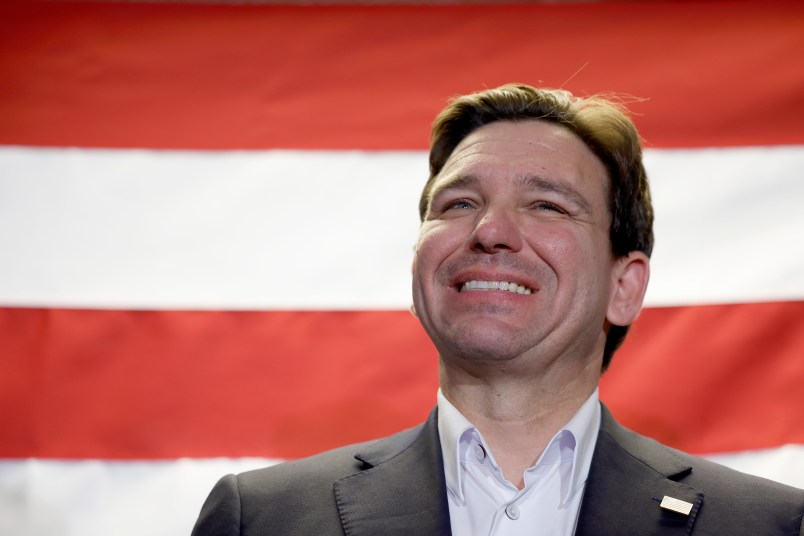This article is part of TPM Cafe, TPM’s home for opinion and news analysis.
There’s already ample evidence that the presidential campaign Florida Gov. Ron DeSantis largely outsourced to a super PAC was among the worst in history. But wait, there’s more! DeSantis’ super-PAC games may well have unleashed federal campaign finance’s nightmare scenario.
A standard knock on DeSantis’ efforts is that he went too far in relying on Never Back Down, the main super PAC supporting him.
Not exactly. Had DeSantis gone a few steps further, he could have successfully exploited a nightmarish loophole in federal campaign-finance law: If an office-seeker gives up not some but all control of their campaign, an independent group can raise and spend an unlimited amount toward electing them to federal office and avoid all disclosure requirements.
How? Start with a trivia question: Who is a candidate for federal office? Is it someone who (A) announces, (B) actively campaigns, or (C) wins a primary?
According to the Federal Election Campaign Act, it’s (D): none of the above. To be a candidate, someone must receive more than $5,000 in campaign contributions, make more than $5,000 in expenditures, or give consent for someone else to do either one. That’s it.
Over time, the $5,000 threshold has become less relevant because realistically, no race can be won without spending more than $5,000. Most modern federal campaigns crush the threshold. According to OpenSecrets, by 1990 the average House candidate spent $407,556 to win and $116,665 to lose. By 2022, those numbers had jumped to $2.8 million and $803,773, respectively.
But Congress wrote that definition of “candidate” years before Citizens United threw the doors open for independent spenders. Now, an independent group can spend unlimited amounts to gather signatures, pay staff, hold rallies, and run ads and a ground operation.
And as long as the person running for office doesn’t lift a finger in the fundraising department — and spends less than $5,000 in gas money — they’re not a candidate under federal law and they don’t have to register with the Federal Election Commission. Instead, the independent group can raise and spend unlimited amounts to get that person elected.

Here’s where the nightmare scenario gets truly nightmarish: Because our hypothetical independent group would not meet the definition of a super PAC, the funders of this non-official candidate could remain completely anonymous.
The loophole that allows this lies in one of the few cases where government legalese makes a situation clearer. To the FEC, “super PAC” is slang for an independent expenditure-only political committee. What’s an independent expenditure? It’s spending made by a person explicitly advocating for the election or defeat of a “clearly identified candidate.”
But in this nightmare scenario, the person running for office is not a candidate. So none of the money the independent group spends is considered advocating for the election of a “clearly defined candidate.” Which means not only can the independent group raise and spend unlimited amounts of money — they don’t have to report any of it. That’s terrifying.
There are minor limitations. The group cannot raise money from foreign nationals or spend more than $5,000 to expressly advocate the defeat of a clearly identified opponent.
Imagine how enticing an offer this might sound: In exchange for being literally forbidden from fundraising during the campaign, an office-seeker must resign themselves to months of traveling around, schmoozing constituents and kissing babies, while an independent, well-funded, and fully staffed independent group does all the grunt work. Where’s the downside?
We haven’t seen this scenario play out before because up until recently, it had been difficult to imagine any serious candidate being so unprincipled as to cede control of their campaign to an outside group. DeSantis, to put it charitably, expanded our imagination.
Never Back Down ran his ground operation. It organized rallies for him. It chartered buses and shuttled him around. Mind you: that arrangement may well have constituted illegal coordination. But DeSantis’s operatives plowed ahead with it; the arrangement only fell apart when the campaign and the super PAC started fighting over strategy.
But had there been no candidate committee, there would have been no one for Never Back Down to coordinate with — or fight with.
Now that DeSantis has demonstrated that a federal office-seeker will give up so much control of their campaign, it’s easy to imagine an office-seeker — particularly an incumbent — going a step further and handing over the reins altogether.
Congress must act quickly to amend FECA’s definition of a candidate before a horde of federal office-seekers and their funders drive an armored car through the loophole DeSantis exposed. Lawmakers can look to the states — Texas’ definition of a candidate, for example, closely matches our popular understanding of the term: “a person who knowingly and willingly takes affirmative action for the purpose of gaining nomination or election to public office.” That would do it.







That PAC would be the “Never back down” PAC That backed down in a flash. Lots of yak about DeSantis but living here in Florida I have a bit better take. Folks saw him. Until he stepped in the light he was just what folks HEARD about him then they SAW him. That was it.
TPM Cafe = Morning Memo writer can’t get their act together.
The white boots and Mickey Mouse. Ron put the loo in loser!
Photo illustrates the difficulty lizard people have learning the human smile.